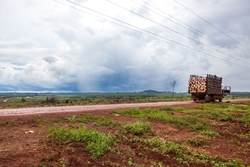
Phnom Penh – Twenty-three companies holding a total of 90,682 hectares in economic land concessions (ELCs) have had their concessions rescinded, while another 20 are being monitored for six months to a year, the Environment Ministry said yesterday.
Companies with another nine ELCs in Kampong Thom province will have their leases reduced from 99 to 50 years, the ministry said.
The statement follows years of lobbying by environmental and lands-rights groups, as well as opposition political parties, about the impact of ELCs on the environment and local communities. They have said some ELCs are both environmentally and socially destructive. Opposition politicians have also accused the government of selling large swathes of the country to foreign companies.
The ministry said that four companies voluntarily rescinded their ELCs, while the size of four others was reduced. ELCs are granted by the Ministry of Agriculture, Forestry and Fisheries as well as the Ministry of Environment.
Development plans of four more ELCs will be presented to an inter-ministerial meeting tomorrow, the Environment Ministry said.
Failure to Develop
Srun Darith, a senior ministry official, said the ELCs that were rescinded or placed under monitoring had either failed to implement their development plans or were behind schedule in doing so. Others had failed to solve land disputes with local communities, Mr. Darith said.
“Some companies had ELCs on land that was claimed by local residents and these ELCs were rescinded and the land was given to the people,” he said. He did not, however, name these ELCs.
They are located in several provinces, including Preah Sihanouk, Kratie, Kampong Speu, Ratanakiri, Mondulkiri and Koh Kong, he said.
More Details Requested
Tek Vannara, executive director of NGO Forum on Cambodia, welcomed the move, saying it showed the Environment Ministry was getting stronger.
He asked, however, for more detailed information about the specific ELCs that had been rescinded and where land had been carved out of other ELCs and given to local residents. Mr. Vannara said this was also important to ensure that local residents did not attempt to illegally take land from legitimate ELCs.
“We want to know what the ministry will do with land taken from the companies. We also want to know clearly the boundaries of the ELCs that were rescinded,” he said.
Mr. Vannara also called for more scrutiny of the ELC contracts by the ministry.
“The ministry should recheck ELC contracts with companies to determine who is responsible for the effects on the environment and people,” Mr. Vannara said. He added that government officials are responsible for taking action against companies that violated their ELC contracts as well as the law.
“We are still concerned about deforestation at ELC, so the ministry must monitor them regularly,” Mr. Vannara said.
“Gov’t Transparent”
Mr. Darith said the government was being transparent about ELCs. All documents, including maps, are posted on its website.
“If they want more information check the documents on the website,” he said.
He also stressed that most of the companies that had lost their ELCs had not implemented the development plans they outlined in their contracts, when the ELCs were granted.
“They didn’t do anything yet or they did too little,” Mr. Darith said.
He said deforestation was not a major concern for the rescinded ELCs because nothing had happened on them. The ministry has a clear plan to develop these areas, he added.
Opposition Welcomes Move
Yem Ponhearith, a spokesman for the opposition Cambodia National Rescue Party, welcomed the ministry’s move on the ELCs, but called for punishment of companies that violate their contracts or the law.
“We support the [the ministry’s decision to] take back the land, but companies that are responsible for deforestation should be fined,” Mr. Ponhearith said. “It is not enough to just take back a piece of paper if a forest has been destroyed,” he added.
The CNRP spokesman focused on ELCs in Kampong Speu and Koh Kong provinces, where sugar plantations owned by Senator Ly Yong Phat have been heavily criticized. “We have seen the consequences of ELCs in Kampong Speu and Koh Kong provinces. People’s land has been damaged and there is no solution. Before the ELCs are issued, citizens should be involved in the process [of vetting them] and land grabbing should be avoided,” Mr. Ponhearith said.
Sam Inn, spokesman of the Grassroots Democratic Party, also welcomed the decision to rescind ELCs that failed to implement their development plans or violated their contracts.
He also called for more monitoring of existing ELCs, which he said covered about 2 million hectares of land in Cambodia. Companies that failed to abide by the law or live up to their contracts should be punished, he said. Mr. Inn said there were cases where ELCs had been granted to companies that just cut down forests and then left. They paid merely $5-$10 per hectare per year to the government for the ELCs, he said.













